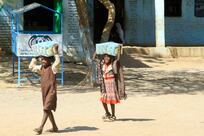COLOMBO // Tamil Tiger militants based outside Sri Lanka are turning to human-smuggling operations to raise money in a bid to revive the group, which was decimated by government forces last year, a Sri Lankan terrorism specialist said yesterday. The rebel operatives who organised a human shipment aboard the Sun Sea cargo vessel that arrived in Canada last week charged up to C$50,000 (Dh31,333) per person, said Rohan Gunaratna, head of the International Centre for Political Violence and Terrorism Research at Nanyang Technological University in Singapore. The ship had 492 Tamil migrants on board.
Mr Gunaratna, who has studied the Tamil Tigers for more than two decades, said the smuggling operations are part of an effort to raise funds to reactivate the group, whose military capabilities were destroyed by the Sri Lankan military in May 2009, ending nearly three decades of civil war. "The Tamil Tigers shipping and procurement network has transformed to a human smuggling network. Members of this unit have special skills to undertake clandestine transport from one destination to another," Mr Gunaratna said. "They had used this to transport arms and ammo and now transport people.
"They have two more ships and if the response in Canada [to accepting these migrants] is positive, the rebels will send more refugees to Canada. If Canada is not possible, they'll look for a new destination," he said. This was the second shipment of human cargo by the Liberation Tigers of Tamil Eelam (LTTE) in 10 months, the first arriving in Canada in October with 79 passengers, 30 of whom were former rebels, Mr Gunaratna said.
"This ship was the main carrier of arms and ammunition for the rebels during the conflict with 95 per cent of the arms coming from South Korea," he said yesterday in a telephone interview. The rebels earned C$1 million by smuggling the ethnic Tamils in October, Mr Gunaratna said. Reports from Canadian media said the smugglers earned C$20m from the latest shipment. Since its defeat, the LTTE has tried to reorganise itself through the support of the Tamil diaspora, elements of which funded the rebels during the civil war, Mr Gunaratna said. About one million Sri Lankan Tamils live abroad, while in Sri Lanka there are three million Tamils out of a population of 20 million. The rebels were fighting for a separate Tamil homeland, and also backed long-time political demands by mainstream Tamil groups for political and administrative power.
Mr Gunaratna said that after their defeat last year, the Tigers splintered into many factions. "Now a faction led by a Norway-based rebel is running the human-smuggling operations and trying to raise funds to resume an armed struggle," he said. The two ships left from Thailand with mostly nonrebel Sri Lankans who had migrated to India and South East Asia, Mr Gunaratna said. Tamils claim discrimination in education, land use, language and jobs allocation, and have been seeking more political and administrative rights in the north and east of the country, where they are the majority.
Dinesh Dodangoda, a former opposition member of parliament and now a Ph.D student in terrorism studies at St Andrew's University in Scotland, said that although the government may have destroyed the Tigers' military capability, the group will remain a potential threat as long as Sri Lanka refuses to address Tamil political demands. The Vancouver Sun in a report yesterday quoted Gloria Nafziger, a Toronto-based refugee coordinator with Amnesty International, which is monitoring Canada's treatment of the latest group of migrants, as saying that while the civil conflict in Sri Lanka is over, the country continues to be "a very dangerous place" for its Tamil minority.
Reports of arbitrary arrest, disappearances and torture of members of the country's Tamil minority are prevalent, as are reports of widespread sexual violence against women by security forces, the article stated. In the face of continuing discrimination against Tamils, Mr Gunaratna said the government behaves as if there is little threat from the rebels. He said Colombo is slow in responding to the anti-government propaganda abroad from the Tamil network and should respond to its allegations of mass murder committed against the Tamils.
"The fact is that the centre of gravity of the LTTE has shifted overseas from Sri Lanka," Mr Gunaratna said. @Email:foreign.desk@thenational.ae




